Fertilizer application of the Onion plant is essential for success. Onions need more nitrogen. Onions need timely utilization of nutrients for maximum growth and productivity of the plant. Choose the type and rate of fertilizer to ensure that all the essential nutrients are sufficient for high productivity. High quality and the best fertilizer are necessary for Onion production. Let’s check out more information about fertilizer management for Onion.
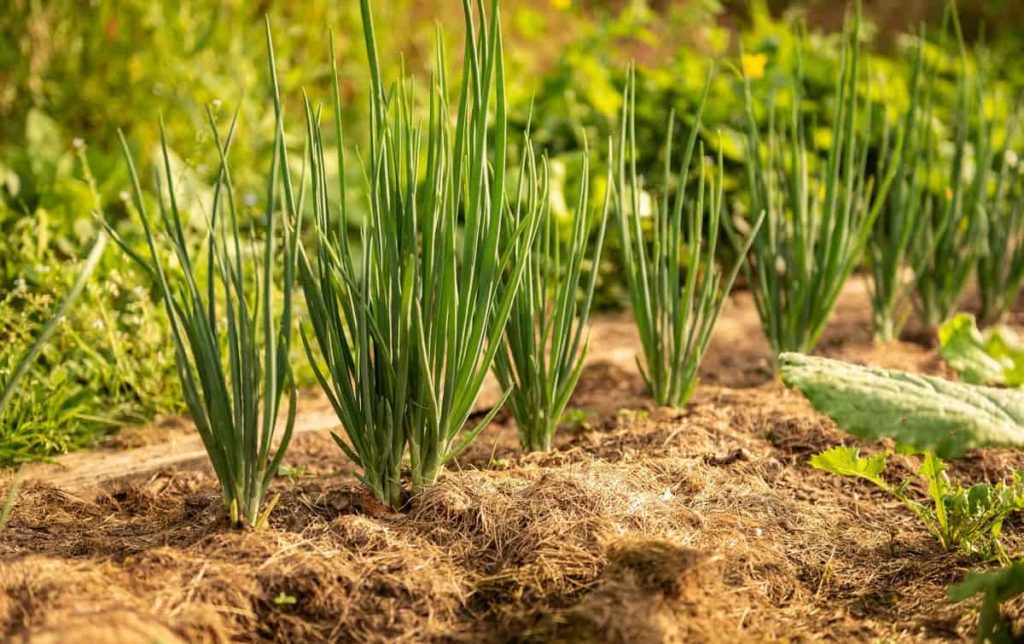
Onions benefit from proper fertilization (ideally based on soil test results), although high nitrogen fertilizers should be used with caution. Excessive nitrogen can delay bulb formation, maturation, and Onion storage. In addition, onion roots are confined to the top 18 inches of soil, making it challenging to supply crop nutrients. Soil testing in the fall, during seed formation, is the best way to meet fertilizer requirements. Knowledge of soil test results, field experience, and specific crop requirements can help determine essential nutrients and utilization rates.
Nitrogen-based fertilizer like ammonium sulfate or ammonium nitrate should be applied at one cup per 20 feet row. The first nitrogen application should be about three weeks after planting, and then continue planting every 2 to 3 weeks. Once the neck begins to soften, do not apply any more fertilizer. Onions have a relatively low nutrient efficiency due to their very shallow root system with very short and short hairy thick roots. Therefore, applying nutrients in irregular and readily available forms close to the root zone is necessary to yield maximum.
Fertilizer management for Onion
Organic fertilizers
Onions are heavy feeders, so they provide plenty of nitrogen and phosphorus. After that, add a cup of bone meal and blood meal in equal parts every 10 feet. Finally, feed young plants with high-quality organic vegetable fertilizers and apply liquid fish and seaweed in the following season to improve crop yield, taste, and appearance.
In case you missed it: How To Start Onion Farming, Questions, Answers
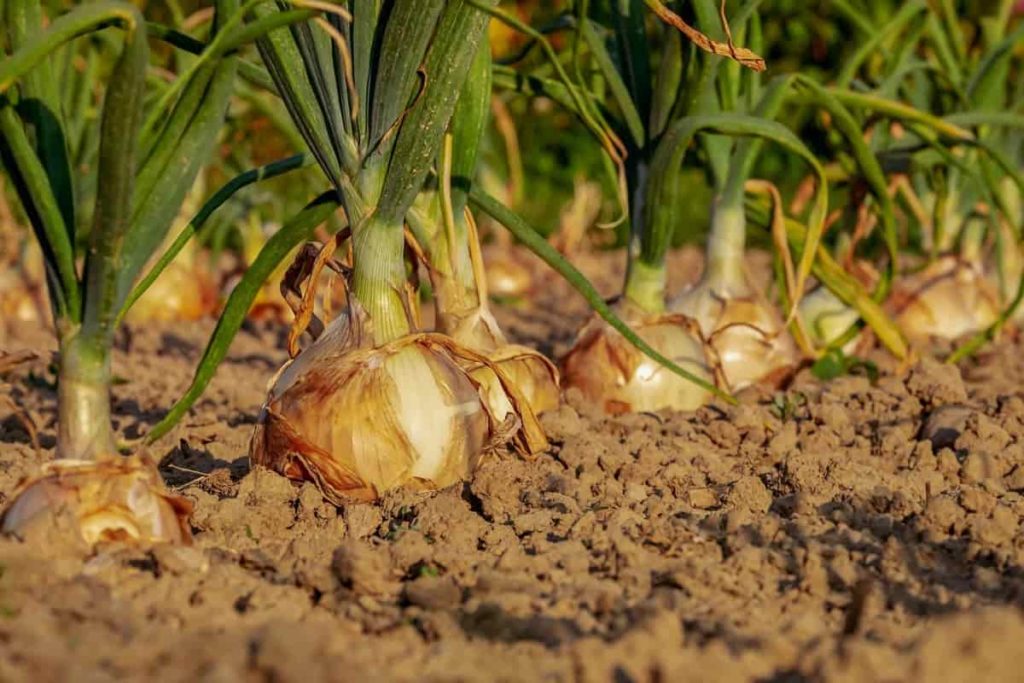
Fertilizers to increase the weight of onion bulb
A balanced crop nutrition program can help improve overall yields by increasing the weight of Onion bulbs.
Nitrogen increases Onion yield – Maximum nitrogen supply is essential for Onion weight. In addition, nitrogen helps produce leaves, and the number of bulb scales increases and the size of the harvested bulb, whether it is Onion or even leeks.
Boron affects the weight of bulbs – Trials confirm that boron has a positive effect on Onion production by increasing the weight of bulbs. It is essential to maintain the correct balance of nitrogen, calcium, and boron in the soil, as high calcium and high nitrogen levels can reduce the amount of boron.
NPK fertilizers
Nitrogen
It is the essential nutrient for Onion plant growth. A typical Onion crop uses about 100 kg of real nitrogen per hectare during the growing season, with most of the nitrogen being taken after the plant bulbs have been planted. Side dressing with nitrogen using small amounts to avoid burning the plants.
It is essential to avoid heavy use of nitrogen late (after mid-July) and after the bulb starts, as it will encourage late maturation and large necks, which are difficult to treat. In addition, excess nitrogen in the bulbs will soften Onion bulbs and poor storage quality during harvesting. Onions require moderate nitrogen, but nitrogen fertilization is still essential because Onions have weak, shallow root systems.
In case you missed it: Growing Spring Onions – Farming Tips, Ideas, Secrets
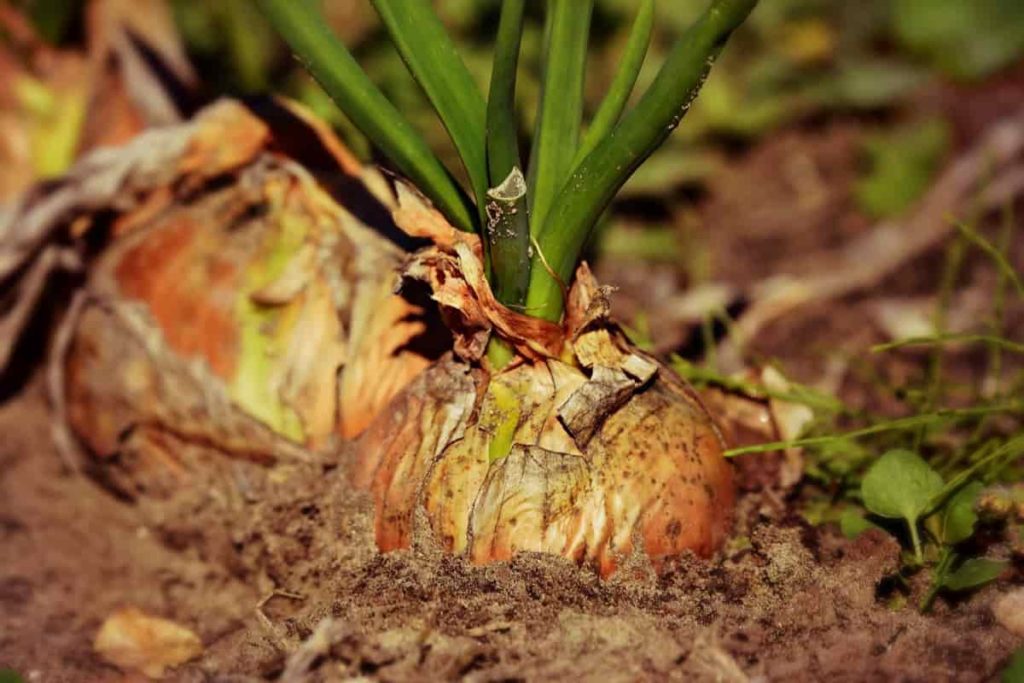
Decaying organic matter provides some nitrogen, so your nitrogen requirements will decrease as your soil organic matter increases. However, nitrogen is a significant component of various amino acids and proteins essential for the protoplasmic constitution, its function, cell division, growth, development, and photosynthetic activity. Therefore, nitrogen fertilizers always increase Onion production.
Phosphorus and potassium
Onions require relatively high levels of potassium and phosphorus. Fertilizers provide these nutrients in the form of potash and phosphate. Phosphorus is essential for early plant growth. Therefore, if a phosphorus strip is applied at the planting time, it should be placed two inches below and two inches below the seed. Onions require moderate potassium, and much of Utah’s soil is rich enough for Onion growth and development.
Phosphorus is essential for carbohydrate conversion, protein metabolism, and phosphorylation. Its deficiency leads to improper growth and poor growth of Onion bulbs. Potassium is necessary for good photosynthetic activity, migration, and utilization of synthetic carbohydrates. Its deficiency causes the yellow-green leaves, tops, and small bulbs to dry out. Onion cultivation requires 100 kg nitrogen, 50 kg phosphorus, and 50 kg potash per hectare. In addition, sulfur is also an essential nutrient for better yields.
Fertilizer Application
- Kharif season – 100: 50: 50: 50 kg NPKS / hectare
- Late Kharif – 150: 50: 50: 50 kg NPKS / hectare
- Rabi season – 150: 50: 80: 50 kg NPKS / hectare
Apply 50% N,100% P, K&S as basic food and the remaining 50% N in two parts 30 and 45 days after transplanting. Topdressing must be completed before the bulb can develop.
Biofertilizers
Bio-fertilizers can be used for either seed treatment or soil application. When applied to seeds or soil, the microbe colonizes the rhizosphere of the plant interior. As a result, it stimulates plant growth by stimulating plant growth by determining biological nitrogen and phosphorus solutions, and the synthesis of growth-promoting substances increases the availability of primary nutrients.
Biofertilizers for Onion crops @ 5 kg/ha are recommended for each Azospirillum and Phosphorus soluble bacteria. The addition of Azospirillum improves soil nitrogen through biological nitrogen fixation. At the same time, the use of phosphobacteria dissolves the non-available phosphorus in the soil, makes them available to plants, and improves the performance of applied P fertilizer.
Micronutrients in Onions
Although very low micronutrients are required to meet Onion production and standard Onion production, an accurate balance of these trace elements is essential. The most critical vital nutrients are boron and iron. They affect productivity and quality. Zinc also plays a role in seed germination.
In case you missed it: Hydroponic Onion Farming – Growing Guide
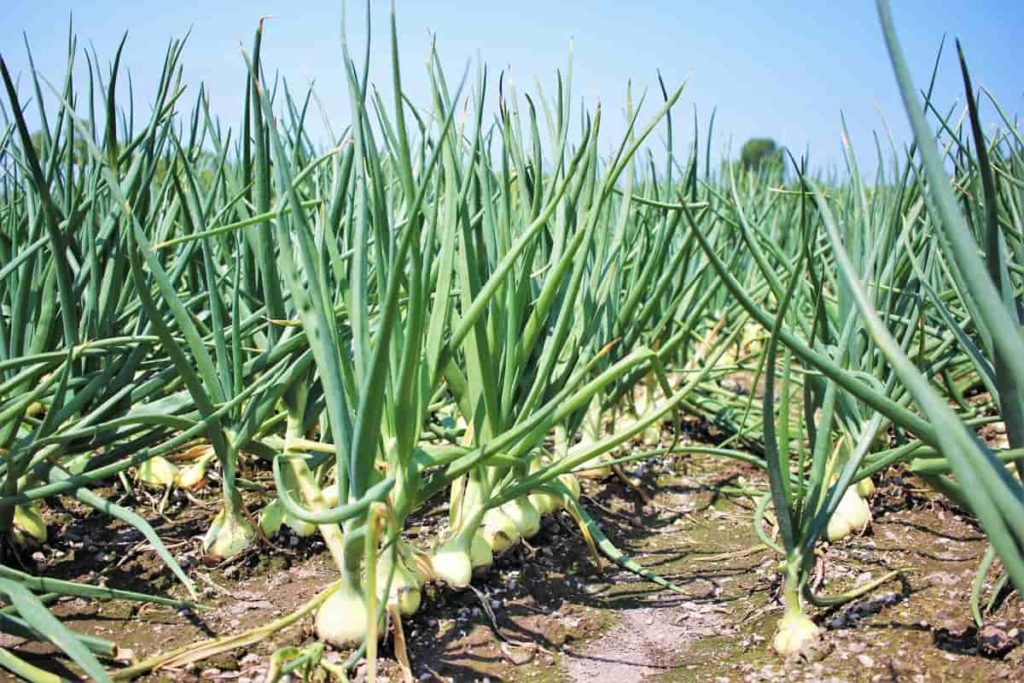
Best fertilizer use to get big Onions
In addition to proper fertilization and watering techniques, the selection of Onion varieties is an essential factor in growing large Onions. Superphosphate acts as a starter fertilizer, encouraging solid and early roots. Do not apply fertilizer after mid-summer. Late fertilizer use encourages new, soft growth, and Onions will not survive. In addition to proper fertilizer, Onions need evenly moist soil to grow. Cover the soil with untreated grass clippings to retain moisture. Spread 1/4-inch grass clippings on the soil every week, and let the clippings dry before adding more.
Why do Onions need Nitrogen?
Nitrogen-based fertilizer will increase the size of Onion leaves and, as a result, increase bulb scales, making them bigger. For a market purpose, big Onions can increase the income of the Onion business. Though, nitrogen fertilizer alone will not produce maximum yield. You need to buy a fertilizer whose chemical composition includes sulfur and phosphorus. Before planting, you first need to test the soil and prepare the soil for Onion fertilizer. If the soil has low levels of natural phosphorus, you will need to add phosphorus to help increase yields.
Easiest way to fertilize Onions
Onions are heavy feeders with a shallow root system, so proper soil fertilization is essential for high-yielding, high-quality Onions. In addition, adequate soil fertility is critical in areas where Onions grow rapidly before the bulbs can form due to the reduction in day length. Different fertility programs will allow you to provide Onions with their nutrients easily.
Applying fertilizer before planting
Phosphorus helps in Onion root development and bulb formation. To provide this, put a handful of rock phosphate or bone meal in the soil before planting. Also, spray 5-10-10 fertilizers on the soil at 2 1/4 cups per 10 feet long, 15-inch-wide row. Alternatively, use 1 cup of 8-16-16 fertilizer or 1/2 cup of 10-10-10 fertilizer. In addition to nutrients, spread a 3-inch layer of fertilizer on the soil to promote soil moisture retention.
Fertilizing during growth
As your Onions grow, side-dressing them with additional nutrients is beneficial for their growth. When the bulbs begin to swelling, dig a 2-inch-deep section with a 10-foot-long row about 3 inches from the plants. Sprinkle 5-10-10 3/4 pounds of fertilizer in the manure and fill it back. Then, water it to bring the nutrients into the root zone. Avoid putting fertilizer on plants, as it can burn them. Alternatively, carefully add a few spadefuls of compost to the soil around the plants.
Tips for select good fertilizer for Onions
Onions need nutritious soil to thrive. Using the right fertilizer will promote their growth and help the plant grow larger, healthier bulbs. For choosing the right fertilizer for your Onion crop, you should pay attention to the percentage of nitrogen, phosphorus (phosphate), and potassium (potash) in the product, which is usually called NPK.
In case you missed it: Onion Seed Germination, Time, Temperature, Procedure
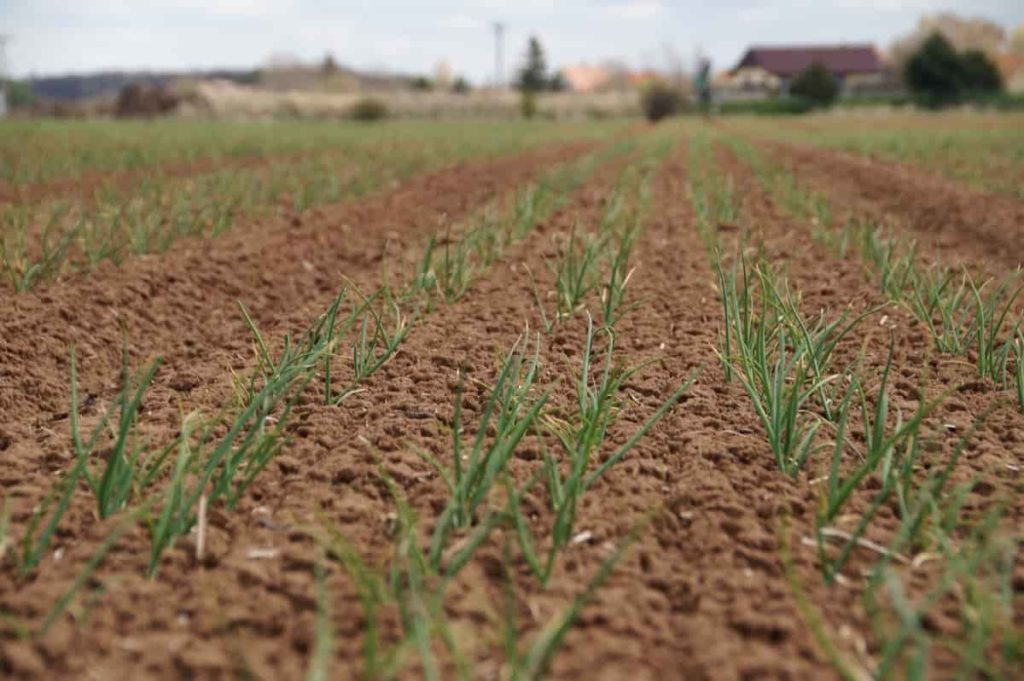
You should choose a fertilizer mixed with a high nitrogen level for the Onion crop. It increases nutrient yields and improves the quality, storage, and disease resistance of nitrogen bulbs.
Fertilizer program
- The fertilizer program should always have a lot of nitrogen.
- Pre-seeding: Apply phosphorus-rich fertilizer at least 3 inches below the seed before planting.
- Three weeks after planting: Apply nitrogen-based fertilizer at 1 cup per 20 feet.
- Every 2-3 weeks: Grow the seeds with nitrogen until the neck is exposed. Do not apply more nitrogen when you feel it is soft.
- Watering: Always water the Onion whenever you feed it. Onions will need more water as they get closer to maturity.
Minor nutrients and trace elements
Onions cannot reach their best product and quality without an adequate supply of minor and trace nutrients, especially copper, manganese, and zinc. The easiest way to make sure your soil contains these minerals is to apply a micronutrient modification such as azomite or kelp meal at 1 to 2 pounds per 100 square feet.
Nutritional deficiencies in onions
Identify and diagnose whether your Onions are suffering from nutrient deficiencies, and you should know about the symptoms and causes and how to control or correct this deficiency.
Nitrogen deficiency
- Symptoms – Yellowing of old leaves. Growth was stunted.
- Correction Measure – Foliar spray of urea 1% or DAP 2% twice weekly.
Phosphorus deficiency
- Symptoms: Slowly growth, maturity blazed. The leaves turn light green, and the bulbs have some dry outer shells. Burn the tip in the old leaves.
- Correction measure – The recommended dose of phosphorus in the soil should be applied when sowing or planting. Spray DAP 2% foliar twice at 15-day intervals.
Potassium deficiency
- Symptoms: Because potassium is highly active in plants, severe deficiency symptoms appear only on young leaves. Symptoms of tip burn, the leaves become dark green and straight. They are bolting promoted. The old leaves turn yellow, and the neck becomes bruised.
- Correction measure: Foliar application of K2SO4 @ 1% twice weekly intervals.
Zinc deficiency
- Symptoms: Irregular formation of leaves. The leaves become narrow.
- Correction measure: For nightly interval, spray ZnSO4 @ 0.5% twice.
Iron deficiency
- Symptoms: Leaf color turns white. The color of the Onion decreases.
- Correction measure: FeSO4 @ 0.5% foliar spray.
In case you missed it: Onion Farming in Polyhouse for Maximum Profits
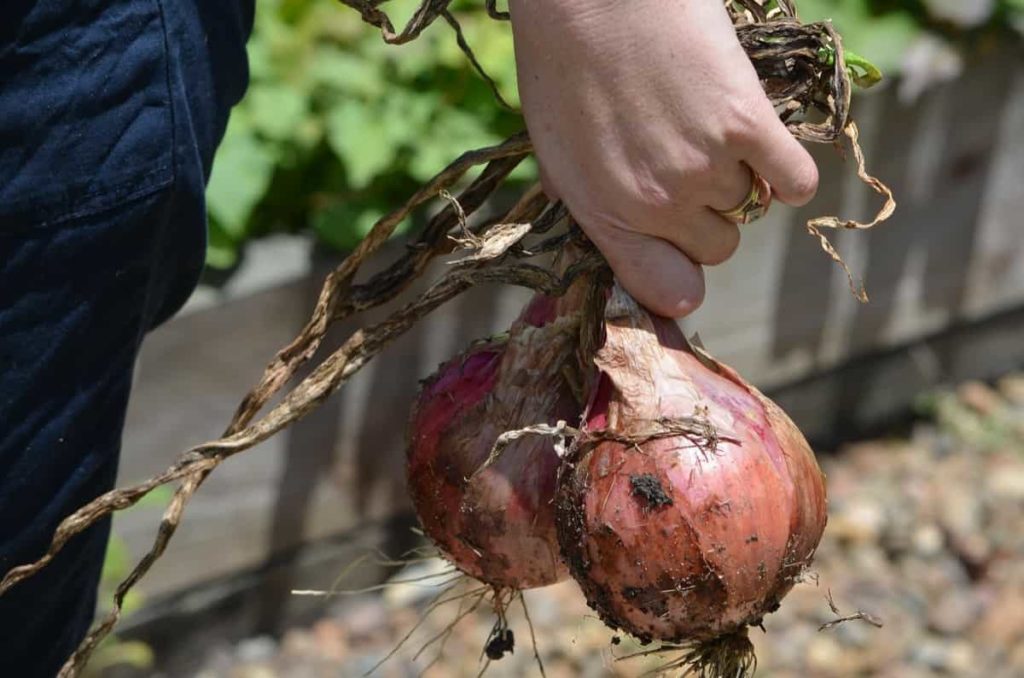
Frequently asked questions about Onion fertilizers (FAQ)
What is the best Onion fertilizer?
Onions need more sources of nitrogen which is applied during the planting and germination stage and later in the growth stage.
Is urea fertilizer good for Onions?
Urea significantly affects Onion growth, production, and vitamin C.
Is urea suitable for Onions?
Therefore, urea foliar may be recommended to enhance the growth of Onions.
Do Onions need phosphorus?
Onions require relatively high levels of potassium and phosphorus. Fertilizers provide these nutrients in the form of potash and phosphate. Apply about 2.2 ounces of phosphate and 4.8 ounces of potash per 100 square feet.
Why are my Onions so small?
Planting different varieties of Onions that are not suitable for your climate will result in smaller Onions. In addition, due to the fluctuations in temperature, the Onion becomes smaller due to early flowering. Finally, lack of nutrients due to competition or poor soil causes small Onions.
- Economical Aquaculture: A Guide to Low-Budget Fish Farming
- 15 Common Planting Errors That Can Doom Your Fruit Trees
- How to Make Houseplants Bushy: Effective Tips and Ideas
- Innovative Strategies for Boosting Coconut Pollination and Yield
- Pollination Strategies for Maximum Pumpkin Yield
- The Complete Guide to Chicken Fattening: Strategies for Maximum Growth
- Natural Solutions for Tulip Problems: 100% Effective Remedies for Leaf and Bulb-Related Issues
- Revolutionizing Citrus Preservation: Towards a Healthier, Greener Future
- Natural Solutions for Peony Leaf and Flower Problems: 100% Effective Remedies
- Maximizing Profits with Avocado Contract Farming in India: A Comprehensive Guide
- Natural Solutions for Hydrangea Problems: 100% Effective Remedies for Leaf and Flowers
- The Ultimate Guide to Choosing the Perfect Foliage Friend: Bringing Life Indoors
- From Sunlight to Sustainability: 15 Ways to Use Solar Technology in Agriculture
- The Ultimate Guide to Dong Tao Chicken: Exploring from History to Raising
- The Eco-Friendly Makeover: How to Convert Your Unused Swimming Pool into a Fish Pond
- Mastering the Art of Delaware Chicken Farming: Essentials for Healthy Backyard Flocks
- 20 Best Homemade Fertilizers for Money Plant: DIY Recipes and Application Methods
- How to Craft a Comprehensive Free-Range Chicken Farming Business Plan
- Brighten Your Flock: Raising Easter Egger Chickens for Beauty and Bounty
- How to Optimize Your Poultry Egg Farm Business Plan with These Strategies
- Subsidy for Spirulina Cultivation: How Indian Government Schemes Encouraging Spirulina Farmers
- Ultimate Guide to Raising Dominique Chickens: Breeding, Feeding, Egg-Production, and Care
- Mastering the Art of Raising Jersey Giant Chickens: Care, Feeding, and More
- Ultimate Guide to Raising Legbar Chickens: Breeding, Farming Practices, Diet, Egg-Production
- How to Raise Welsummer Chickens: A Comprehensive Guide for Beginners
- How to Protect Indoor Plants in Winter: A Comprehensive Guide
- Ultimate Guide to Grow Bag Gardening: Tips, Tricks, and Planting Ideas for Urban Gardeners
- Guide to Lotus Cultivation: How to Propagate, Plant, Grow, Care, Cost, and Profit
- Agriculture Drone Subsidy Scheme: Government Kisan Subsidy, License, and How to Apply Online
- Ultimate Guide to Raising Araucana Chickens: Breed Profile, Farming Economics, Diet, and Care
- Bringing Hydroponics to Classroom: Importance, Benefits of Learning for School Students
- Ultimate Guide to Raising Polish Chickens: Breed Profile, Farming Economics, Diet, and Care
- Ultimate Guide to Raising Australorp Chickens: Profile, Farming Economics, Egg Production, Diet, and Care
- Silkie Chicken Farming: Raising Practices, Varieties, Egg Production, Diet, and Care
- Sussex Chicken Farming: Raising Practices, Varieties, Egg Production, Diet and Care
- Homemade Feed Formulations for Livestock: Discover Cost-effective Starter to Finisher Feed Recipes